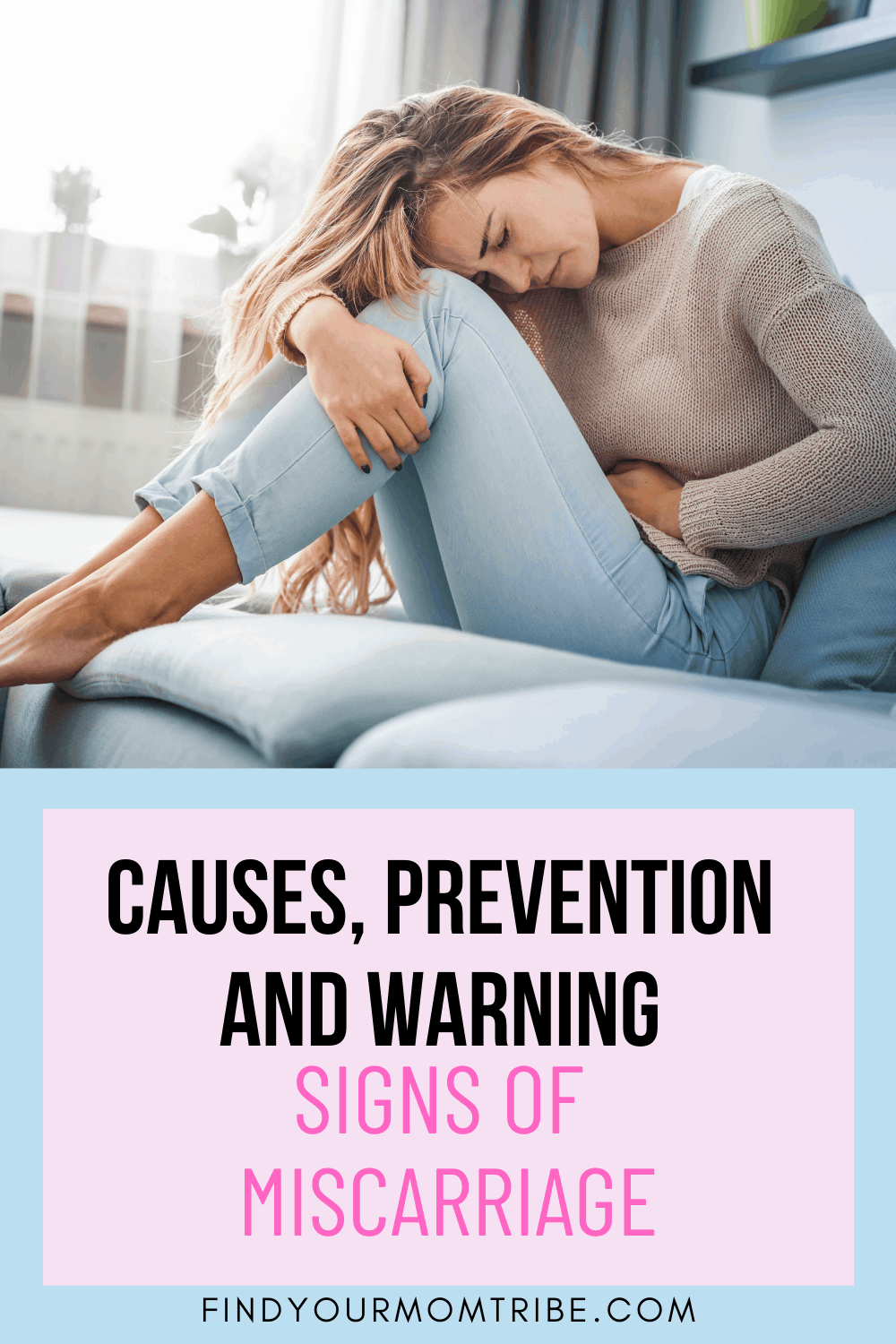There’s likely not a single pregnant woman who hasn’t investigated signs of miscarriage, even if her pregnancy is perfectly healthy. On the other hand, there are also those who are, sadly, interested in miscarriage symptoms for a reason.
Miscarriage is a spontaneous loss of a pregnancy. Generally speaking, any pregnancy that ends within the first 20 weeks of gestation is considered a miscarriage, after which the term stillborn is used.
The American College of Obstetricians and Gynecologists (ACOG) claims that some kind of pregnancy loss occurs in 10 percent of known pregnancies. However, there are a lot of miscarriages that happen in early pregnancy (meaning just a few days) and don’t become part of the statistics.
There is also something called a missed miscarriage.
This is a situation in which the body doesn’t recognize that the spontaneous abortion happened. Instead, the placenta usually continues releasing pregnancy hormones, which brings the mother to feel all the pregnancy signs and expect a healthy pregnancy.
Here is everything you need to know about pregnancy loss and all the possible warning signs of miscarriage.
Why Do Miscarriages Happen?

Once a miscarriage happens, there is nothing you can do about it. You can’t go back and save your baby, even if you’d give everything you have for that option.
Nevertheless, this doesn’t mean that you shouldn’t be concerned about why it happened in the first place.
This information is useful for your future since it will probably reveal to you the problem that caused your miscarriage.
1. Chromosomal abnormalities
The number one reason most miscarriages in the first trimester occur is due to chromosome issues. In fact, more than half of spontaneous abortions are caused by chromosomal abnormalities.
Some of the more common chromosome-related issues include monosomy, trisomy, translocation, inversion, rings…
Simply put, these chromosomal abnormalities are the cause of various birth defects or directly cause a miscarriage.
2. Problems with the placenta
The placenta develops during pregnancy inside the uterus. It’s an organ without which your baby could never survive.
The placenta is what gives your baby nutrition and oxygen. Also, it removes the waste from your uterus. Basically, it connects your baby and the inside of your uterus with the rest of your body through the umbilical cord.
Even though this organ is essential, sadly, it can sometimes be what causes your early miscarriage or stillbirth.
Placenta previa is a condition in which the placenta grows over the cervix’s internal opening.
When this happens, it might cause heavy bleeding, which is dangerous for both mom and baby.
On the other hand, placenta accreta is when the placenta is too attached to the uterus, causing heavy bleeding in the mother.
This is another potentially life-threatening condition for moms as well as infants.
The thing that is most likely to cause early pregnancy loss connected with the placenta is abruption, where the placenta separates from the wall of the uterus before actual birthing begins.
The problem with this issue is that absolutely nothing can be done except going into labor.
However, sometimes, that is impossible because of the baby’s gestational age. In that case, early pregnancy loss happens.
Another thing that can be fatal for your baby is chorioamnionitis, a bacterial infection of the placental wall. It usually comes through the vagina and cervix and can’t be solved without antibiotics.
When you go through a miscarriage, you can never know for sure what caused it. However, since your placenta is right there, it would be a good idea to examine it.
An autopsy of the placenta can tell much about your spontaneous abortion. Most importantly, the information can help you out with your next pregnancy.
3. Hormone imbalance
According to science, the number one hormone that impacts pregnancy is estrogen.
A woman’s body produces high levels of estrogen when pregnant – more so, in fact, than during her entire life when not pregnant.
Estrogen forms the blood vessels in your uterus and increases the blood flow. Also, it helps the uterus to perform nutrient transfer.
With this in mind, it’s no wonder how significant hormone levels are in each pregnancy.
A hormonal imbalance in the form of low estrogen levels can cause a spontaneous miscarriage by preventing the implantation of a fertilized egg to develop as it should.
5 Warning Signs Of Miscarriage

1. Vaginal bleeding
Even though vaginal bleeding is one of the first signs of an early miscarriage, it doesn’t mean that you should automatically worry when you notice it.
You see, most women experience some form of vaginal bleeding during the first trimester.
Light vaginal bleeding (similar to a normal period) doesn’t necessarily have to be an alarming sign. Light spotting is normal in early pregnancy.
Nevertheless, if it does happen, it’s time to contact your OB/GYN (health care provider specialized in obstetrics and gynecology) as soon as possible.
They will tell you if everything is alright with you and the baby, and will give you clear instructions regarding your next move.
On the other hand, sadly, vaginal bleeding can also be a signal of a miscarriage. It may come and go for a few days or even weeks.
In fact, it can be a sign of a threatened miscarriage. When this happens, your cervix is closed but you see all other signs of miscarriage.
At this point, anything is possible. You might continue with a healthy pregnancy or suffer a pregnancy loss.
2. Vaginal discharge of tissue or fluid
One of the signs of a late miscarriage is the discharge of fluid or tissue from your vagina.
Increased vaginal and cervical discharge and even vaginal thrush are perfectly normal in your early pregnancy. But if the discharge is bloody or mucusy, it is cause for concern.
There’s also the possibility that increased vaginal discharge can also be a sign of a bacterial infection.
If this is the case, you’ll experience additional symptoms such as itching, a bad odor, and/or pain.
3. Lower abdominal pain
The thing that goes hand in hand with vaginal bleeding or discharge is also abdominal pain. However, this symptom itself is rarely enough for you to start suspecting a miscarriage.
Even with a healthy pregnancy, a woman’s body goes through a set of changes.
Therefore, cramping and light abdominal pain are nothing unusual. Keep in mind that your uterus is in the process of expanding, so you’re probably feeling it.
However, the difference between “normal” abdominal pain and the type you should worry about is in the exact place where you feel cramping.
Namely, if you feel some unpleasant changes in your lower abdomen, rather play it safe by getting checked up by your health care provider.
RELATED: Stomach Flu While Pregnant: Is It Dangerous And What To Do
4. Severe back pain
Backache is a common pregnancy complaint and perfectly normal throughout all trimesters. After all, a whole new human being is literally growing and developing inside of you.
Suddenly, you’re gaining weight, which means new pressure for your back.
On the other hand, if your severe back pain is too much to handle, it can be a sign of spontaneous abortion.
This is more likely to happen during late pregnancy.
Another red flag you shouldn’t overlook is when backache progresses to cramps and abdominal pain. These symptoms usually go hand in hand.
5. Amniotic fluid leaking
Amniotic fluid protects the fetus. It’s a liquid that’s comprised mostly of water, and as your baby grows, his or her urine. It also contains important nutrients, antibodies, and hormones.
Being this crucial for your baby’s survival and development, it’s quite obvious that leaking of amniotic fluid is fatal for your fetus.
Although one of the rarest signs of a miscarriage, when you do notice it, there is absolutely no doubt about what’s going on.
Leaking of amniotic fluid usually accompanies a second or a third-trimester miscarriage.
The first step into determining if it is indeed amniotic fluid leaking is to look at it. Amniotic fluid has no odor and it’s clear.
However, in some cases, it can contain traces of blood clots. The next way to tell is to actually smell it to rule out urine.
You see, many pregnant women leak urine because of the pressure on their bladder, which is nothing you should worry about.
However, once your amniotic fluid starts to leak, it won’t stop as easily as once your bladder is emptied.
If you experience leaking of amniotic fluid, get to the doctor ASAP, as it could be a sign of a dilated cervix and one of the symptoms of a miscarriage.
6. No more symptoms of pregnancy
A healthy pregnancy brings with it some typical symptoms like breast tenderness and morning sickness.
Of course, not every woman experiences the same signs of pregnancy, but they are for the most part quite common, especially in early pregnancy.
Once they’re over, you’ll probably be happy to have gotten ridden of these uncomfortable pregnancy side effects. Unfortunately, however, a sudden loss of these symptoms can actually be cause of alarm.
You see, the hormones that cause each one of these symptoms are at their peak at the beginning of your pregnancy and throughout the entire first trimester.
So, them disappearing just like and you not feeling pregnant anymore can in fact be one of the early signs of a miscarriage at 6 weeks.
7. HCG urine or blood test
HCG test is a type of urine or blood test that measures the level of human chorionic gonadotropin hormone present in your system.
Raised levels of this hormone are one of the surefire symptoms of pregnancy.
However, HCG levels significantly decrease after pregnancy loss. Therefore, this test can help determine whether there has been a miscarriage.
Risk Factors For Miscarriage

1. Previous miscarriages
It has been proven that previous miscarriages are one of the first risk factors you should pay attention to.
In fact, if you’ve had two consecutive miscarriages, your risk of another one increases to 28% and after three miscarriages, it increases up to 43%.
2. Age
Age affects the possibility of getting pregnant – that is a well-known fact. As a woman gets older, her eggs decrease in number.
However, that’s not all. It is more likely for an older woman’s eggs to have chromosomal abnormalities and we already know that these abnormalities can cause a miscarriage or a stillbirth.
The risk of miscarriage therefore increases with the mother’s age.
When you’re 35, the risk of having a spontaneous abortion is 20%. By the time you reach the age of 40, it increases to 40%, and it goes up as high as 80% for women over 45.
3. Diabetes or thyroid problems
Women who have diabetes before pregnancy have up to 14% chance of experiencing spontaneous abortion.
Diabetic women are more likely to produce too much amniotic fluid, which can be fatal for the fetus. This condition is called polyhydramnios.
Other health issues that might cause miscarriage are thyroid problems. Untreated hyperthyroidism and hypothyroidism both increase the risk of pregnancy loss.
4. Smoking
Besides being damaging to a person’s health condition in general, smoking is especially dangerous for pregnant women and therefore forbidden by many medical practitioners.
The reason is pretty simple: Tobacco smoke contains carbon monoxide, which prevents the fetus from getting enough oxygen.
5. Substance abuse and drinking alcohol
Your baby is connected to you through the umbilical cord. Therefore, everything that enters your bloodstream passes through to the fetus as well.
If you’re familiar with the negative side effects of substance abuse and drinking alcohol in adults, you can only imagine how much harm these bring to a fetus who is only just developing.
Naturally, this doesn’t apply to prescription medications. Your doctor will be extra careful with giving you drugs while you’re pregnant.
In general, all medication should be avoided where possible during pregnancy.
However, some drugs are essential for the mother and baby’s survival and health, and only in this case will they be prescribed.
6. Prenatal tests
According to scientific studies, prenatal tests don’t bring a high risk of pregnancy loss. However, the risk is still present.
Of course, we’re talking about invasive sampling here. One of them is amniocentesis.
Amniocentesis is a procedure where a certain amount of amniotic fluid is removed from the uterus.
This fluid surrounds the fetus and contains fetal tissue. It is sampled for the diagnosis of various health problems in a baby.
Even though this test is almost harmless in the second trimester, it is proven to be more risky in the first 14 weeks of pregnancy.
In the case of miscarriage, pregnancy loss usually occurs during the first 3 days after the procedure.
Another invasive prenatal procedure that carries a low risk of miscarriage is chorionic villus sampling (CVS). This test is used to diagnose certain genetic defects.
During this procedure, a sample of cells is taken from the placenta. If the test is not done properly, the placenta can be harmed, which brings the risk of fetal fatality.
7. Weight
Your body weight cannot technically remain the same during pregnancy (nor will you have the same prepartum and postpartum body). In fact, you shouldn’t even put any effort into making it the same.
However, the weight you had pre-pregnancy and the weight loss or gain during pregnancy are closely related to the risks of miscarriage, and studies have shown that obese women are more likely to suffer from pregnancy loss than those with a healthy BMI index.
Septic Miscarriage

Simply put, a septic miscarriage is an infection of the placenta and fetus, followed by the miscarriage itself.
This infection easily spreads to the uterus and might even cause sepsis. Sepsis is potentially fatal as it impacts all of your organs.
Symptoms of a septic miscarriage are high fever, chills, abdominal pain, perineal pressure, cramps, smelly vaginal discharge, and septic shock.
Ectopic Pregnancy

In an ectopic pregnancy, a fertilized egg implants in the fallopian tube.
A fallopian tube stretches from the ovaries to the uterus and carries the fertilized egg towards the uterus.
At least, this is how things should work when a woman gets pregnant. However, in an ectopic pregnancy, the egg never makes it to its intended destination.
Chemical Pregnancy

A chemical pregnancy is actually an early pregnancy loss. It means that the fertilized egg never implanted into the uterus.
This kind of early miscarriage happens even before the fetus can be seen on an ultrasound, and is more common than you might think.
A chemical pregnancy essentially has no symptoms whatsoever. In fact, many women experience it without ever noticing.
Molar Pregnancy

In a molar pregnancy, the egg and placental tissue don’t develop properly from the very start of the fertilization.
In some cases, the fetal tissue never develops, while in others, the fetus doesn’t survive the beginning of the pregnancy.
The worst part about a molar pregnancy is that, at first, the benign tumor appears to be like any regular pregnancy.
However, what differentiates the two (apart from the baby itself) is almost constant bleeding, vomiting, cysts, and an overactive thyroid.
This condition is potentially extremely dangerous and needs immediate medical attention.
Anembryonic Pregnancy

Anembryonic pregnancy (also known as blighted ovum) occurs when a fertilized egg never becomes an embryo, yet the gestational sac keeps on growing.
Even though you have all the early pregnancy symptoms (including a positive pregnancy test), there is no fetus.
After a while, you’ll experience signs of miscarriage.
What Happens Next?

When you suffer a miscarriage, your uterus has to be emptied.
This can be done in numerous ways, depending on your situation.
Keep in mind that there are several types of miscarriage. Each type requires a different follow-up procedure.
-
Natural course
In the case of miscarriage in the first few weeks of gestation, a woman’s uterus usually empties naturally on its own. This is especially true if the major symptom was vaginal bleeding.
In this instance, it is likely that all of the fetal tissue was cleared out of your system. This means that you experienced a complete miscarriage.
That said, it is still wise to see your OB/GYN to have yourself checked out.
-
Drugs
On the other hand, if you’ve experienced all the signs of miscarriage but the fetal tissue hasn’t been cleared out, you’ve gone through an incomplete miscarriage.
Your doctor will probably prescribe you some medication to help the process along.
After taking the medication, in a few hours, you can expect bleeding, which means that the fetal tissue is being expelled.
-
Dilation and Curettage
Finally, if the above doesn’t work and you’ve suffered an incomplete miscarriage, you’ll have to undertake a surgical procedure called dilation and curettage.
During this surgery, a layer of your uterine tissue will be removed.
You will bleed approximately one week following this procedure and therefore should be using postpartum pads.
Prevention Of Miscarriage

Sadly, sometimes pregnancy loss occurs despite doing everything by the book.
It just happens due to natural causes.
However, there are certainly some things you can do to lower the risk of spontaneous abortion.
1. Don’t smoke, drink alcohol, or use drugs during pregnancy
Regardless of whether you’re simply a light smoker, social drinker, or recreational drug user, all of this has to stop.
You’re already well aware of the horrible impacts of tobacco, alcohol, and substance abuse on a fetus.
What many pregnant women seem to forget is that it’s crucial to stay away from second-hand smoke as well.
Passive smoking also endangers your and your baby’s health; it’s merely another way to inhale tobacco smoke and all the other hazardous ingredients that come along with it.
Alcohol isn’t only a cause of miscarriage.
In fact, there is something called fetal alcohol spectrum of disorders, which is a range of disabilities that drinking during pregnancy can bring about.
Substance abuse is always a big no-no, and especially during pregnancy. Remember: Everything you take reaches your baby through the umbilical cord.
Only drugs prescribed by your doctor are permitted, nothing else.
2. Keep a balanced diet
How many times have you heard that an expecting mother should eat for two now since she’s carrying a whole new human being? Well, that’s not the case at all.
In fact, during the first two trimesters, your calorie intake is the same as what your non-pregnant self would require.
And in trimester three, you’ll only need roughly an extra 200 calories daily (that’s equivalent to only one tall glass of whole milk).
Naturally, you shouldn’t starve yourself either. Keeping a well-balanced diet that includes grains, fruits, vegetables, and protein sources should be your goal – of course, not forgetting to also keep up with your fluid intake and prenatal supplements.
3. Stay away from stress
I’m sure you’re familiar with the fact that stress brings a lot of health problems, such as high blood pressure, increased risk of a heart attack, diabetes, and so on.
Well, it’s even more harmful for a pregnant woman.
The fact is that everyday life goes on, regardless of your state. Unfortunately, you can’t put yourself in a bubble that protects you from everything negative during these 9 months.
But, you have to do everything in your power to steer clear of stressful situations if you want to decrease your chances of a miscarriage.
4. Remain active
Remember one thing: Pregnancy is not an illness – especially if you have no health problems during it.
One of the worst things you can do to yourself and your baby is to spend the entire 9 months lying in bed when there are no medical indications that you should be doing so.
Of course, you’re not going to run a marathon or participate in a weightlifting championship. But you have to stay active, just adapting your activities slightly to accommodate your new state.
To Wrap Up
If you happen to notice signs of miscarriage, it’s important to seek medical help right away. Don’t postpone the inevitable because you’ll only be compromising your own health.
And remember, you’re allowed to grieve your loss. Read some comforting miscarriage quotes to help you see how others have felt and dealt with it, and don’t hesitate to join a support group for women who’ve been through the same tragedy.
After some time, you may even choose to start a charity fund in remembrance of your lost baby. And if you don’t feel up to receiving any miscarriage gifts, ask your friends to donate some money to the fund instead.
Trust me, time does heal. You’ll probably remember your miscarriage for the rest of your life, but I promise you one thing: You will recover! I’m sending you tons of love and prayers.
- References:
- Early Pregnancy Loss. American College of Obstetricians and Gynecologists (ACOG). May 2015.
- Wrick, Maya. Mayo Clinic Guide to a Healthy Pregnancy. Second Edition, September 18, 2018.
Like this post? Please share or pin it for later. You can also stay in the loop and follow us on Facebook, Instagram or Pinterest.

This post contains affiliate links. Please see our full disclosure for more info.

